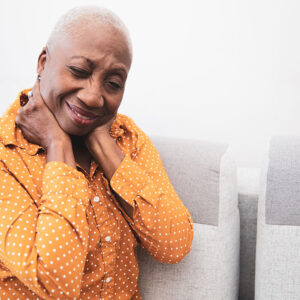
Communicate This Way -- Cut Depression Risk in Half
Consider two methods of communication.
Method 1: Chatting face to face, a method Homo sapiens has employed for about 100,000 years. (Actually, no one knows how long human beings have conversed using language, but that’s the estimate made by Noam Chomsky, the world’s most famous linguist, so let’s go with that.)
Method 2: Chatting on the phone, emailing, tweeting, Facebooking, YouTubing, or blogging. We’ve done the phone thing for roughly a century, email for perhaps 20 years, and the rest for less than 10.
So… which of these, done often, is most likely to keep depression at bay?
Long-suffering readers of these missives know my mantra — if we co-evolved with a behavior, it probably promotes health and happiness. Conversely, new human behaviors are guilty until proven innocent.
And that’s why Method 1 wins handily, at least among folks over 50.
Here’s the lowdown:
A new study published in the Journal of the American Geriatrics Society found that among older adults, those who met regularly in person with family and friends were much less likely to be depressed than those who emailed or spoke on the phone.
Researcher Alan Teo, MD, pointed out that strong social bonds have long been known to support emotional health. But this was the first study to assess what type of communication was best.
And the result was unequivocal.
Teo and his team looked at more than 11,000 people in the U.S. aged 50 and older. All were participants in the longitudinal Health and Retirement Study at the University of Michigan.
The team looked at how often each person spoke in person; on the telephone; and through writing, including email, with friends and family.
Then they assessed the risk of depression two years later.
They discovered that having a low level of face-to-face social contact almost doubled the risk of becoming depressed two years later.
Conversely, it didn’t seem to matter whether the subjects had a few or many phone conversations or written or email communications. These had no effect on the likelihood of depression.
So… is there a “prescription” here?
Well, subjects who had face-to-face encounters with family and friends at least three times a week had the fewest depressive symptoms two years later.
Sounds good to me.
It also sounds like a bare minimum.
I’ll be frank. The most health-destructive trend in modern life is not overprocessed carbohydrates. It’s not sedentary lifestyles. It’s not air or water pollution, damaging as those may be.
The most health-destructive trend is the increasing tendency of people to isolate.
I’ve cited this information before, but it’s worth repeating. A Brigham Young University study published in March looked at earlier studies encompassing about 3 million people.
It found that loneliness is more dangerous to health than obesity, and roughly as dangerous as alcoholism.
While it’s true that in the BYU study the dangerous physical health effects of isolation became more pronounced as people passed age 65, the negative effects of isolation crossed all age boundaries.
So…
Perhaps modern 20-somethings will soon find using social media to be as fulfilling and health-supporting as what the Silicon Valley types call “meatspace” discussion.
But I doubt it.
The world changes swiftly. Our evolution-driven needs are far less tractable.
For a future that any of us is likely to be around to see, meatspace will likely retain its value — the mocking moniker notwithstanding.
If you are human, I believe you can safely conclude that anything short of regularly conversing with another human being who shares your physical space is dangerous to both mental and physical health.
But I dislike framing this as a negative. So let’s flip it.
At a deep level, woven into our DNA, being with real people in real places can help make us physically and mentally vibrant.
So are social media useless?
Not at all.
Text, email, tweet, or Facebook message your friend and tell him or her where to meet you.
Regards,

Brad Lemley
Editor, Natural Health Solutions
Citation:
1. Alan Teo, M.D., M.S. Does Mode of Contact with Different Types of Social Relationships Predict Depression Among Older Adults? Evidence from a Nationally Representative Survey. Journal of the American Geriatrics Society, October 2015
Written By Brad Lemley
Brad Lemley is a science and health writer and former senior correspondent for The Washington Post and Discover magazine. He is a tireless advocate for safe, natural, self-directed healthy living practices and therapies.
View More Free Articles
America’s Next Prescription Epidemic?
It started with a prescription to help you stay focused… But now, for millions of Americans, that little orange pill bottle could be a gateway to something much darker. According to a brand-new national study, one in four adults prescribed stimulants for ADHD is misusing them—and nearly one in 10 has developed a full-blown use...
Is Your Diet ACTUALLY Healthy? Here’s How to Tell
I’ve probably uttered the phrase “healthy diet” when talking to patients, family, and friends more times than I’ve had cups of coffee—and that’s saying something! But I’ll admit it’s not always entirely clear what a healthy diet looks like. What does healthy eating really mean? Let’s take a look… Good news—healthy eating doesn’t mean you...
7 Natural Ways to Tackle Pain Without Pills
On Tuesday, we explored a promising new frontier in pain relief: terpenes, natural compounds found in cannabis (and other plants) that may ease pain without the risks of opioids. That research is still developing. But what if you’re looking for help right now? Good news: You don’t have to wait for a pharmaceutical breakthrough to...
Mailbag: Pinched to Pain Free with Natural Sciatica Solutions
“I have been suffering from sciatic pain in my hip and groin. I try to do exercises to stretch it. But ever since I slipped on the ice and fell on my left hip it seems to be getting worse. Is there any help for this?” -Painfully Pinched Dear Pinched, I understand how frustrating sciatic...
New Cannabis Discovery Could Ease Pain—Without the High
A few years ago, everywhere you turned, someone was talking about CBD. The cannabis extract had exploded in popularity for everything from anxiety to inflammation to joint pain. And while the CBD conversation continues, another cannabis compound is quietly making headlines. One that could—believe it or not—provide relief from all kinds of pain. Without the...
"Sinful Trio" SLASHES Metabolic Syndrome Risk
Are you tired of hearing your doctor’s endless “don’t eat this, don’t drink that” lectures? Well, this Easter Sunday, I’ve got news that might just have you hopping happily to your pantry. Turns out, some of life’s tastiest pleasures could help protect you from one of today’s most common health threats—metabolic syndrome. Let’s dig into...
Microplastics’ Hidden Link to Chronic Disease EXPOSED
By now, you’ve heard about microplastics. These tiny fragments of plastic have invaded virtually every corner of our planet. We’re just beginning to understand the scope of the threat, but we know microplastics pose a serious risk to our health. If you’re like many folks, you’ve shrugged off those dangers, thinking there’s nothing you can...
Shakespeare’s “Remembrance” Herb Protects Memory
You probably have a jar of rosemary sitting in your spice rack. Perhaps you sprinkle it on potatoes or add it to roast chicken. But what if this humble herb could hold the key to fighting one of the most devastating diseases we can face as we age? It turns out a hidden compound inside...
Is Your Gut “Good”? How to Check
I always get asked, “How do I know if my digestion is working right?” Well, the answer is pretty simple, but it’s also a little gross. A simple test you can do at home reveals whether your digestion is normal or not. Your digestive system processes everything you eat—extracting nutrients, and eliminating waste. The time...
Hidden Sugar Trap Fuels Lung Cancer
We’ve long known that smoking is the main villain behind lung cancer. But what if your dinner plate has quietly joined forces with the enemy? A new study from the University of Florida reveals that the typical Western diet could be laying the groundwork for aggressive lung cancer growth by feeding tumors with stored sugar....









